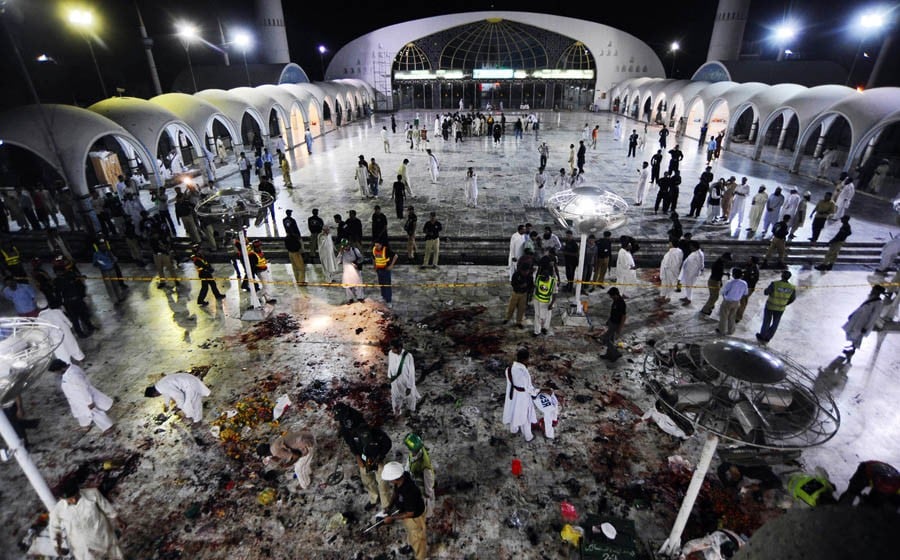
Will the fatwa issued by 31 religious scholars from across the Sunni-Shia divide against terrorism achieve its objective?

On May 28, at the International Islamic University Islamabad, as many as 31 religious scholars from across the Sunni-Shia divide and the Ahle Hadith-Barelvi-Deobandi tripartite division issued a nine-point unanimous edict -- fatwa.
Two of its points are relevant for the current article. The fatwa declared suicide attacks in Pakistan haram or forbidden, and declared the state to be the only legitimate authority to initiate jihad. The reason behind this fatwa was to stop or at least discourage the Taliban from engaging in terror activities inside Pakistan.
Will this fatwa achieve its objective? For three reasons, in all likelihood, the efficacy of the fatwa will be very limited at best and non-existent at worst.
In the first place, the fatwa incorrectly assumes the ascendancy of ideology over tangible factors in curbing the menace of religio-sectarian violence. The decree, in all naivety, implies that it is the militant ideology, one deeply rooted in the misinterpretation of Quran and the traditions of the Holy Prophet (PBUH), which is the cause of violence as perpetrated by Taliban and others of their ilk. Contrary to what the edict suggests, the unalterable fact is that we have mainly been suffering from the blowback of a plethora of international, regional and national events or crises of contemporary times, especially given the state’s alleged patronage to various non-state entities for perceived national interests.
Thus, there is a problem in diagnosing the issue of Taliban violence.
Second, confusion clouds the whole debate on the sources of militant violence at the ideological level. Observers believe that militant outfits of the Deobandi persuasion bedevil both the Pakistani state and society and a fatwa from Deobandi ulema would suffice to arrest the trend of suicide attacks and violence in the country. This oversimplifies the otherwise complex problem of Taliban violence.
We should guard against a common fallacy of considering Deobandi school of thought as something monolithic. It is true that Taliban are overwhelmingly Deobandis, it is equally true that majority of Deobandis are neither Taliban nor their supporters. As a matter of fact, Taliban in Pakistan do not represent mainstream Deobandi school of thought. Three examples will help understand this.
Wafaq ul Madaris Al-Arabia, the board of more than 15,000 Deobandi madrassas in Pakistan, does not approve Taliban violence, hence the Deobandi signatories of the fatwa such as Qari Hanif Jalandhri, Mufti Rafi Usmani and Maulana Abdu Razaq Sikandar. Similarly, the JUI-F, the largest political party of Deobandi persuasion does not support the Pakistani Taliban, unlike pre-9/11 when the party had thrown its weight behind the Taliban government in Afghanistan. Therefore, it should not come as a surprise that the JUI-F’s Chief Maulana Fazlur Rehman and the party’s then provincial head of Balochistan chapter Maulana Sherani have survived three and one suicide attacks respectively. Most recently, Maulana Ghafoor Haideri, Senate Deputy Chairman and JUI’s general secretary, was injured in a suicide attack.
Likewise, Tablighi Jamaat, a missionary-cum-reformist movement of the Deobandi variety with mass following, neither subscribes to Taliban’s modus operandi of bringing about a Shariah regime through the use of force nor supports Islamist political parties that operate in the electoral arena. In a nutshell, mainstream Deobandis may be ambivalent, indifferent and, at times, apologetic of Taliban violence but they do not approve of their ways.
The third factor that militates against the success of the decree is that Deobandi ulema are poles apart on the question of the state’s role in undertaking jihad. Whereas some ulema decree that no jihad can be undertaken without the permission of an ‘Islamic state’, others, taking their cue from Taliban’s 1990s jihad against Afghan warlords, justify suicide attacks as legitimate and rule that state’s permission is not mandatory in carrying out jihad.
Seen this way, the fatwa against the ‘privatisation’ of jihad represents the views of the former school of thought. Thus, before the government can issue a fatwa against the privatisation of jihad, it is necessary to identify the ideological nature of the threat we face, and then issue a fatwa accordingly.
Which brings us to the nature of threat at the ideological level. At the ideological level, the state is at war with an eclectic ideology that derives from Deobandi creed with an essentially Wahabi streak, and practiced by fringe groups from three different militant arenas. Punjabi Taliban are a fringe group of people who come from different militant outfits linked to Punjab’s sectarian-turf war and the freedom movement in Kashmir. In the beginning, their common cause with Pashtun Taliban in the tribal areas was the trio’s avowed opposition to the Musharraf government which they had accused of betrayal on the Kashmir and Afghan fronts after 9/11.
Unsurprisingly, the government’s alleged accommodation of parent militant organisations is because of the seeming perception that violence against the state is exclusively perpetrated by splinter groups other than their parent bodies.
What might be a mildly effective fatwa?
In order to slightly dent the credibility of Taliban in carrying out attacks inside Pakistan, it would take the state to issue a unanimous fatwa, one involving ulema from Afghan Taliban, Jamia Haqqania Akora, Ahle Sunnat Wal Jamaat, Jaish-e-Muhammad and Jamat-ud-Dawah. In the event, it is highly unlikely that even such a decree would affect the Taliban operational capacity. The fatwa may discourage common public from sympathising with terrorists but it will matter the least to hardcore militants.
Until the government tackles the real, tangible sources that engender Taliban violence, any attempt lesser than that would be equivalent to "hacking at the branches of evil" without "striking at the root."